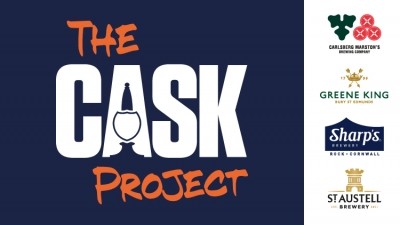THE CASK PROJECT
Cask needs to premiumise, research reveals

Speaking at the Future of Cask Matters seminar at the launch of Cask Ale Week, award-winning beer writer Pete Brown said there was “so much scope” to premiumise the category, but quality was vital.
“It does depend on quality. The best way to kill cask is to give it a premium image, drive people to it and serve them a dodgy pint.”
Presenting new research on the cask ale market, Brown said despite the cost-of-living crisis, premiumisation was not going to end. “Faced with having to spend less money, the last thing people are going to do is switch to a less premium brand. When purse strings are tightened, people are more likely to choose a premium brand.
“The more premium a drinks category is, the better it performs. Where cask is sold at the higher price point, the rate of sale is higher. The more expensive cask is on the bar, the quicker it sells. There’s nothing else left to say!”
He pointed to the fact Timothy Taylor’s is one of the best performing brands and one that insists on a higher price point.
Tough competition
He also highlighted that while cask is pretty much the cheapest product on the bar, most non-cask drinkers think it’s expensive. “These are people who are currently drinking Mediterranean lagers who think they can’t afford to buy a pint of cask. People already think it's expensive, so why not make it more expensive?”
The majority of cask drinkers remain in an older category, however, the idea that the image of cask is outdated among younger drinkers is not the case.
“We keep telling ourselves that younger drinkers see cask as boring and old fashioned, but I see no evidence of that.
“What they are doing is saying it's not relevant to them, they don’t think it's old fashioned, they don’t think of it at all. That’s both a shocking problem and a great opportunity as it means we’ve got a blank slate.”
Within the 18 to 24 age group, only 15% will choose beer on a visit to the pub, they’re “twice as likely to choose spirits and cocktails”
“Forget carbonisation and all that, we’re losing them to cocktails,” he added. “51% of vodka being drunk is by 18 to 24-year-olds - that’s the competition guys.”
Education is key
Education is another sacred cow that needs to be re-examined, Brown said, pointing out that while 70% of core cask drinkers will claim to be knowledgeable of cask, only a third actually know what they’re talking about.
He says the scale of the task of trying to educate so many is huge and is it necessary? “When only one third of core cask drinkers knows what they’re talking about, does that drinker want to be educated? Did they need to be educated in the properties of different botanicals when they started drinking gin? I’ve got a big question mark over the need for education.”
One big area of opportunity to target younger drinkers is when it comes to the virtual world, he pointed out. “People are often deciding on drinks choices before getting to the venue and this is more prevalent among 18 to 24-year-olds. This is a massive problem for cask. Around 66% check a venues website before they go, while 59% check a sites social media.”
He said this was “catastrophic” for cask because very few pubs put any focus on the category with their online drinks menu, with a lot more devoted to gins and cocktails.
“So if I’m making my drinks choice before I get to the venue, and I’m doing that using online drinks menus, I’m not even seeing cask. What are 18 to 24-year-olds drinking again? Cocktails and gin, and oh yes, that’s in pride of place on the online menus.”
Need for premiumisation
Speaking at the same event, Tim Dewey, CEO of Timothy Taylor’s, echoed the need for premiumisation. “We’ve let cask get into a terrible state,” he said. “35% of the market has been lost in the eight years I’ve at Timmy Taylor’s. As an industry, we’ve allowed it to become commoditised.”
He said that was the fault of the brewers, not the publican or multiple operators, selling it not on quality but on ABV point. He pointed to the fact that Marston’s, the UK biggest brewer of cask beer, publishes a price guide that puts cask in the “ghetto”.
Staff training was also a key tool for operators looking to maximise sales of cask, according to beer expert Annabel Smith.
“You wouldn’t put people in the kitchen without training, but it’s happening all the time with the cask ale category. They need to know how to care for it, condition it and deal with any issues. A lot of yield issues is down to a lack of training.”
She added that communication was also key and lessons from how perishable products were dealt with on the food side could apply. She said for products approaching shelf life, get staff focused on selling it and don’t discount it. When products in the kitchen are close, the chef will use them to create specials and sell at a higher price. She urged the same for cask beer.







